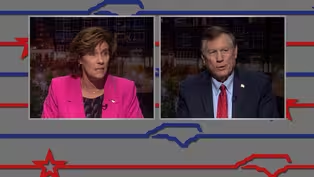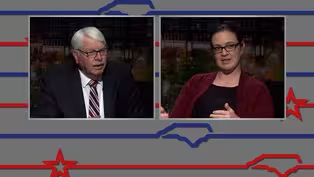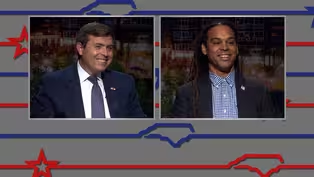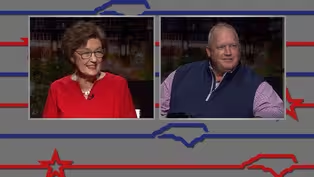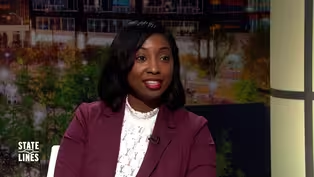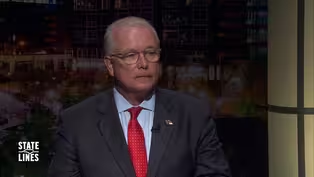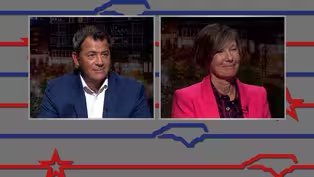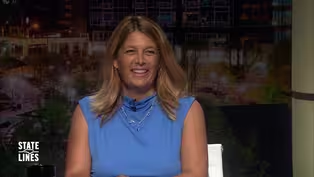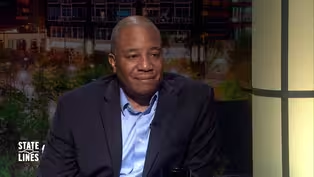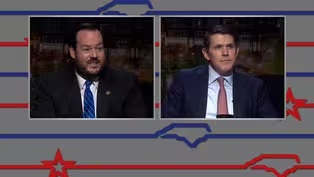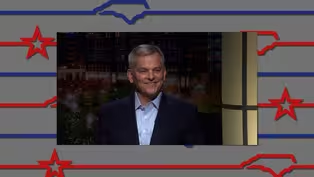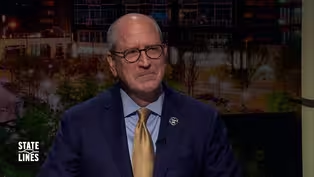
Jeff Jackson, Democratic Candidate for NC Attorney General
Special | 12m 50sVideo has Closed Captions
An interview with Jeff Jackson, Democratic candidate for NC Attorney General (2024).
Jeff Jackson is running as a Democrat for North Carolina's Attorney General. He discusses his 2024 campaign with PBS NC's Kelly McCullen. This interview was recorded on Monday, August 12, 2024.
Problems playing video? | Closed Captioning Feedback
Problems playing video? | Closed Captioning Feedback
State Lines is a local public television program presented by PBS NC

Jeff Jackson, Democratic Candidate for NC Attorney General
Special | 12m 50sVideo has Closed Captions
Jeff Jackson is running as a Democrat for North Carolina's Attorney General. He discusses his 2024 campaign with PBS NC's Kelly McCullen. This interview was recorded on Monday, August 12, 2024.
Problems playing video? | Closed Captioning Feedback
How to Watch State Lines
State Lines is available to stream on pbs.org and the free PBS App, available on iPhone, Apple TV, Android TV, Android smartphones, Amazon Fire TV, Amazon Fire Tablet, Roku, Samsung Smart TV, and Vizio.
Providing Support for PBS.org
Learn Moreabout PBS online sponsorshipMore from This Collection
During major election cycles, PBS North Carolina's public affairs team sits down for in-depth conversations with candidates running for Governor and Council of State positions. PBS North Carolina has invited major party candidates to a one-on-one interview with State Lines host and executive producer Kelly McCullen. Interviews are scheduled throughout the summer.
2024 NC Commissioner of Insurance Candidates
Video has Closed Captions
Mike Causey (R) and Natasha Marcus (D) discuss their campaigns for NC Commissioner of Insurance. (26m 46s)
2024 NC Commissioner of Agriculture Candidates
Video has Closed Captions
Sarah Taber (D) and Steve Troxler (R) discuss their campaigns for NC Commissioner of Agriculture. (26m 46s)
2024 NC Commissioner of Labor Candidates
Video has Closed Captions
Luke Farley (R) and Braxton Winston II (D) discuss their campaigns for NC Commissioner of Labor. (26m 46s)
2024 NC Secretary of State Candidates
Video has Closed Captions
Elaine Marshall (D) and Chad Brown (R) discuss their campaigns for NC Secretary of State. (26m 46s)
Jessica Holmes, Democratic Candidate for NC Auditor
Video has Closed Captions
An interview with Jessica Holmes, Democratic candidate for NC Auditor (2024). (12m 32s)
Dave Boliek, Republican Candidate for NC Auditor
Video has Closed Captions
An interview with Dave Boliek, Republican candidate for NC Auditor (2024). (12m 58s)
2024 NC Lieutenant Governor Candidates
Video has Closed Captions
Hal Weatherman (R) and Rachel Hunt (D) discuss their campaigns for NC Lieutenant Governor. (26m 46s)
Michele Morrow, Republican Candidate for NC Superintendent of Public Instruction
Video has Closed Captions
An interview with Michele Morrow, GOP candidate for NC Superintendent of Public Instruction (2024). (12m 57s)
Maurice "Mo" Green, Democratic Candidate for NC Superintendent of Public Instruction
Video has Closed Captions
An interview with Mo Green, Democratic candidate for NC Superintendent of Public Instruction (2024). (13m 7s)
Video has Closed Captions
Wesley Harris (D) and Brad Briner (R) discuss their campaigns for NC Treasurer. (26m 46s)
Video has Closed Captions
Josh Stein (D) discusses his campaign for NC Governor. (26m 46s)
Dan Bishop, Republican Candidate for NC Attorney General
Video has Closed Captions
An interview with Dan Bishop, Republican candidate for NC Attorney General (2024). (12m 44s)
Providing Support for PBS.org
Learn Moreabout PBS online sponsorship[courageous music] [courageous music continues] - Joining us on the State Lines set, Representative Jeff Jackson, Democratic nominee for Attorney General in North Carolina.
Mr. Jackson, good to have you on.
- Good to be here.
1677.
- There are only, was it 400?
- It's amazing.
- Well, not quite 400 years yet.
Where were you in 1677.
- Yeah, a twinkle in the eye.
- Of somewhat, way back.
[Jeff chuckles] Well, Jeff, tell us about yourself.
We were talking off camera about name recognition on what's called down-ballot Council of State races.
No matter how well-known and how hard you work to get your name out there, most folks still don't know who runs for office.
Who's Jeff Jackson?
- I'm a husband and a father of three, 16, 9 and 5, from Charlotte, currently represent them in Congress, District 14.
This is going to be my one and only term as a member of Congress.
Before that, served in the State Senate for four terms.
Before that was a criminal prosecutor in Gaston County, outside Charlotte.
And before that, served in Afghanistan with the Army.
I'm currently a major in the National Guard.
This is year 22 for me in the military.
- How long have you had your eye on the State Attorney General's race?
There was always the rumor, Josh Stein was going to attempt to graduate out of that chair into the Governor's Office.
He's there, open seat, but how long were you percolating on the idea?
- I was thinking about it while I was a member of Congress because the state Supreme Court election had flipped, I was pretty sure that there were going to gerrymander the congressional district and that I was going to be out of a job in Congress.
Had always been interested in that potential.
And then, push came to shove.
They did the redistricting, we were completely gerrymandered, and it became clear that this was going to be the most important public service opportunity of my lifetime.
So jumped in the race the day after or two days after the redistricting, which happened last October.
- Let's break it down.
What did you learn from serving those years in the North Carolina Senate that prepares you for today?
And I'll ask you about your House service, one term, but a lot happened.
- Yeah, a lot happened, a very eventful term.
When I was in the State Senate, when I first got there, I didn't know hardly anybody there, so I made a decision to speak with every member of the majority party, one-on-one, in their office.
It took me six months.
Session ended before I could finish.
I had to drive out to Phil Berger's law office and meet with him.
He was kind enough to take the meeting.
And every bill that I got passed in the four terms that I served there, I could trace back to one of those early one-on-one conversations.
That's where you learn people's zones of reasonability.
Same in Congress.
There's personal relationships at the committee level and the subcommittee level, they make a huge difference.
For the front page issues, personal relationships, there's not a lot of traction there.
But most of the issues that we deal with, as you know, they're not front page issues.
And personal relationships, being able to trust the person you're working with, makes a huge difference.
- I've seen you in candidate forums recently and some of the issues are more seemingly about Congress, congressional issues, immigration, abortion, this, that, federal arguments.
But as Attorney General, and if I'm a voter looking at you, looking at the entire field of candidates, but speaking for you, what issues should they be paying attention to in your estimation when they cast that vote for Attorney General?
- One big thing the next attorney general is going to be taking on is this ongoing fentanyl epidemic.
We're losing an average of nine people a day.
I think of this in terms of the supply side and the demand side.
On the supply side, the AG has an obligation to do a better job of identifying and breaking apart the distribution cells that exist within our state.
General Assembly just passed an anti-money laundering law.
We had been a state that didn't have one.
It goes into effect in December.
It would be a very important tool for the next Attorney General to use to break apart those distribution cells.
On the demand side, it's about the most effective form for treatment.
The folks who are addicted to fentanyl, they're not using it to get high.
They haven't gotten high in years.
They're using it to stave off withdrawal, which is why the most effective form of addiction treatment for fentanyl is medicated-assisted.
Gets you through the withdrawal period.
My job as Attorney General would be to advocate for the most effective form of addiction treatment, - But attorney generals are tough on crime, and sometimes having a treatment-first approach is viewed as soft on crime, and I think that's come up in the debate.
How do you balance that out?
How could you convince the Republican legislature to say, "Hey, we get it, people do need to go to jail and serve time, but we need to get them treated."
- Yeah, 100%.
That's why you start with the supply side conversation.
You talk about how we're going to do a better job of identifying and breaking apart the distribution cells that exist within our state, the connections to organized crime.
We have a new tool there with an anti-money laundering law.
There's definitely a tough on crime conversation that needs to be had about this.
- Do you think fentanyl is it out of control and the state must wrangle it in and then start attacking it?
Or is it well-organized but just huge, and therefore, it's a mountain that can be climbed, but you must start somewhere with law enforcement and with prosecution?
How do you see it?
- I think it's the latter.
I think it's a mountain that must be climbed, and as far as working with prosecution and law enforcement, a lot of this is about coordination between local, state, and federal.
US attorneys in our state are doing a fantastic job in using their resources to go after these guys.
- If elected, how much of what Attorney General Stein may leave behind in culture, in politics, and positions would you carry over into the early days of your administration as you get on your feet if elected?
- Well, one thing that I agree with was his approach to how to represent the state.
I think he saw the job of Attorney General, you are, in addition to being the top prosecutor, you're the state's lawyer.
So when the state gets sued, it's your obligation to represent the state, which means you have to do that even when you personally agree or disagree with what the state may have done, what the General Assembly may have done.
Josh Stein was willing to represent the state in lots of matters with which he personally disagreed because that's the job.
There is an outer limit to that, and the outer limit is the state and the federal constitution.
So it would be wrong of me to defend the state if I genuinely felt there was a clear constitutional problem.
But that is the exception to the rule.
- How do you go about explaining that to ordinary voters or citizens who are both Republican and Democrat?
Because Mr. Stein did draw a line, very public, but we didn't get to the meat of the matter.
He would just say, "I think it's unconstitutional, that's why I'm not doing it," which, of course, led to a lot of bars being thrown in Raleigh and in the statewide media.
So how much do you owe it to tell people when you think something is unconstitutional, and do you call out legislators for that?
- I think you do owe it to give them a full explanation.
Because it deserves to be the exception to the rule, you need to explain to them, "Here's the rule, here are all the times where I have represented the state where I kind of personally had an issue with it, but I'm not doing it this time and here's exactly why."
If I were a voter, I would want to hear a detailed explanation of why.
I think Josh has done that on the very few times he has made that decision, and that's what voters could expect from me.
- Are there some issues that you think the legislature has already crossed that line, in the general sense, with certain issues that you say, coming in, "Republicans, you're not going to have me as a representative on this particular issue."
- It's very rare, it's not for me to prejudge what they may or may not do there, I'm going to take a fresh look at all of those instances.
- How do you think your relationship will be, and I've asked this of all, anyone running for an office, from Labor Commissioner up to the Attorney General, how do you think you'll get along with the General Assembly?
New crop of Democrats there.
Some have replaced you, and now you've got Republicans there who could have a super majority if you arrive?
- I think I'm going to get along well.
The idea is the Attorney General is supposed to be basically nonpartisan.
When I'm interacting with the General Assembly, it's probably going to be along the lines of, "Hey, I need this tool to help keep people safe."
I've served my entire time in the State Senate on the Judiciary Committee.
That would be the main committee, I think, that the AG would intersect with in making those legislative proposals.
I want this job because it's really not about left versus right, it's just about doing what's right.
If that's the energy that you bring to the state legislature, I think they'll reciprocate.
- In a race that's based on law and order, how safe is North Carolina right now in your interpretation?
The fentanyl crisis is out there, that's certainly a safety issue.
Anything else?
How should people feel about law and order in this state?
- Fentanyl crisis is out there.
It's very real.
Nine people a day, major problem.
Juvenile crime has also gone up.
In particular, larcenies, grand theft auto has gone up.
And if you talk to law enforcement about how to deal with that, they're asking for more outreach program to keep juveniles off the streets to give them safe places to go after school.
I think a good role for the Attorney General is in advocating for those kinds of programs.
- What sort of social programs or agenda would you like to implement as you come in?
Because, you know, keeping youth off the streets and healthy activities, anything else out there that you can stump on and say, "If you like me, this is what I'll try to get through our General Assembly."
- Well, people associate with law enforcement with lots of local law enforcement.
A couple state law enforcement people know off the top of their head, like State Highway Patrol.
There are over a dozen different forms of state law enforcement and they're not all funded in a standardized way.
Some of them are really underfunded.
The DMV Theft Bureau, which we rely on to help combat grand theft auto, is really underfunded.
I want to be a champion for law enforcement, making sure that they're properly paid, especially law enforcement at the state level.
Look, if you want good response time, if you want to give community policing a real chance, you have to have properly funded law enforcement.
- I was going to ask you about that.
As Republican/Democratic issues, how heavy to apply law and order through local police and local sheriffs versus community policing.
Sounds a little softer, sounds like it's more of a person-to-person approach.
How do you balance that?
How do you thread that with voters?
Some say we need to really crack down in our streets.
Other people say, "No, they're doing it too heavy handed as it is."
- Well, the primary directive here is to keep people safe.
So I'm interested in supporting protocols that allow us to do that.
If you talk to law enforcement, particularly in some of our urban areas, the reason they use community policing is because they've found establishing those relationships is really important for keeping people safe because they get calls about who to be on the lookout for, who just committed a crime.
Being able to be trusted in all these diverse communities, really important for keeping people safe.
- How important is it for you to pay attention to what's going on at the local level?
The rape kit issue just almost is, it's swallowed up a whole bunch of headlines, lots of money.
They've cleared that backlog, so justice is on its way for a lot of people who've been assaulted.
So, do you stay on top of that?
Anything else out there you're seeing that, as Attorney General, you need to tackle?
- It's interesting because there are regional disparities to the types of crime that we're seeing, the public threats.
In certain parts of the western part of our state, it's not fentanyl as much as it's methamphetamine.
And when you're out there talking to law enforcement, they're telling you about how meth is being manufactured in two-liter Coke bottles.
So you do have to have a regional approach.
- How much outreach have you done to local sheriffs and local police as a candidate?
- I spoke to the Sheriff's Association 10 days ago, had a lot of good conversations with them.
- Let's talk about your public-facing persona.
Attorney General can be a quiet office, it can be a loud office.
As as a rep, you do your TikToks, you talk to the viewers directly.
You did it on the floor of the State Senate, if I remember correctly.
And my first video of you was seeing the snowstorm, and you guys were trapped there.
How forward-facing do you need to be?
When do you turn inward and just do the job of the State Attorney General?
- I don't have all the answers to that question yet.
I know that I want to be able to use social media for transparency, but also for public safety.
For instance, talking to young people about how, because of how fentanyl is now laced into everything, there's no such thing as safe experimentation with drugs.
Being able to be a sitting Attorney General with a major social media reach and connect with young people directly about those messages, I think would be a really good use for social media.
Am I under any illusion that the day-to-day work of the AG is as interesting to people as what they see coming out of Congress?
No, of course not, and I wouldn't try to force that.
But I think I can use the job in, or rather that tool in a way that helps the job.
- Do you see agencies and other commissioners and such copying you in some way as a direct outreach?
Has it been satisfying for you professionally or personally?
- It has been very satisfying to see that there's still an appetite for being spoken to in a normal tone of voice.
That people are interested in conversations like this without all the pounding on the table.
I'm a little surprised actually.
- All right.
This is Jeff Jackson, Democratic nominee for North Carolina Attorney General.
Mr. Jackson, thanks for making the trip here to the State Lines studio.
- Good to see you.
[courageous music] [courageous music continues]

- News and Public Affairs

Top journalists deliver compelling original analysis of the hour's headlines.

- News and Public Affairs

FRONTLINE is investigative journalism that questions, explains and changes our world.












Support for PBS provided by:
State Lines is a local public television program presented by PBS NC
